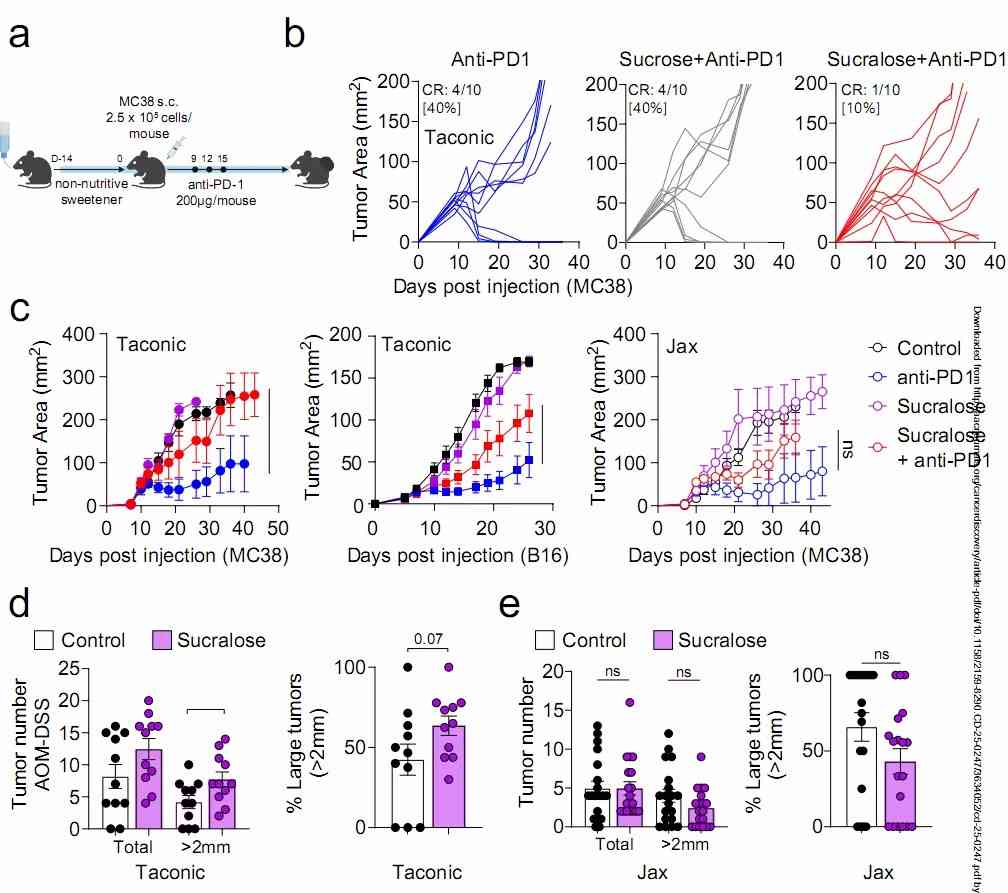Shocking Discovery: Common Sweetener Sucralose May Undermine Cancer Immunotherapy
In recent years, with growing public awareness of healthy eating, non-nutritive sweeteners (NNS) like sucralose, due to their low-calorie properties, have become extremely popular in food and beverages. However, the potential impact of these seemingly harmless sweeteners on human health, particularly their impact on the effectiveness of immunotherapy in cancer patients, has become a hot topic of research.
Relevant data shows that globally, approximately 24% to 37% of American adults consume non-nutritive sweeteners in their daily diet, and this prevalence is high among both obese and normal-weight individuals. Furthermore, with the increasing popularity of cancer immunotherapy, a growing number of studies are examining the impact of dietary factors on treatment outcomes. The relationship between gut microbiome composition and immunotherapy response has particularly attracted the attention of numerous researchers.
Recently, scientists from the University of Pittsburgh and other institutions published a research report titled "Sucralose Consumption Ablates Cancer Immunotherapy Response Through Microbiome Disruption" in the journal Cancer Discovery. The report provides in-depth insights into the impact of sucralose consumption on the efficacy of cancer immunotherapy and its underlying mechanisms. By analyzing dietary data from cancer patients and combining animal model experiments, the researchers clearly demonstrated how sucralose alters the composition of the gut microbiome, thereby affecting T cell function and immunotherapy response. This significant discovery not only opens up new perspectives for cancer treatment but also provides a solid scientific basis for the development of future dietary intervention strategies.
 Fig. 1. Sucralose may inhibit immunotherapy response.
Fig. 1. Sucralose may inhibit immunotherapy response.
Immune checkpoint inhibitors (ICIs) have achieved remarkable efficacy in the treatment of various cancers. However, a significant proportion (most) of patients remain unresponsive to this treatment. Numerous studies in recent years have shown that gut microbiome composition is closely associated with ICI treatment response. Based on this, the researchers boldly speculate that non-nutritive sweeteners in the diet, particularly sucralose, are likely to affect the effectiveness of immunotherapy by altering the composition of the gut microbiome.
High Sucralose Intake is Directly Associated with Ablated ICI Response
Morder, Kristin M., et al. conducted a dietary analysis of 132 patients with advanced cancer (91 with melanoma and 41 with non-small cell lung cancer) receiving PD-1 inhibitors and found that those consuming more than 0.16 mg/kg/day of sucralose had a significantly lower objective response rate (ORR). Melanoma patients showed a trend toward a lower response rate, while NSCLC patients showed a statistically significant decrease in response rate.
Even more concerning were the survival data: progression-free survival (PFS) was significantly shortened in the high sucralose intake group—median values decreased from 13.0 months to 8.0 months for melanoma patients and from 18.0 months to 7.0 months for NSCLC patients. In patients with high-risk resectable melanoma receiving neoadjuvant anti-PD-1 therapy combined with a TLR9 agonist, high sucralose intake was associated with a lower major pathological response rate (MPR) and shorter relapse-free survival (RFS), with the median decreasing from 25.0 to 19.0 months.
Sucralose Drives Immune Resistance Via the Gut Microbiota
To investigate the mechanism, researchers replicated clinical findings in mouse models of MC38 adenocarcinoma and B16 melanoma: mice exposed to sucralose (0.09 mg/mL in drinking water) developed significant resistance to PD-1 inhibitor therapy, with accelerated tumor growth, reduced T cell infiltration, and shortened survival. Notably, this effect was microbiota-dependent—mice from different suppliers (with varying gut microbiota compositions) showed significant differences in sucralose sensitivity, but co-housing eliminated these differences, suggesting that the microbiota is a key mediator. Further studies have revealed that sucralose significantly destabilizes the gut microbiome: the abundance of Firmicutes and Proteobacteria increases, with a particular overgrowth of Gram-positive bacteria such as Clostridiaceae and Lachnospiraceae. Fecal microbiota transfer (FMT) experiments have demonstrated that fecal transfer from sucralose-fed mice to normal mice directly induces resistance to PD-1 inhibitors. Conversely, FMT from anti-PD-1 responsive mice reverses sucralose-induced resistance.
Arginine Depletion Leads to T Cell Exhaustion
Single-cell RNA sequencing revealed that sucralose exposure induces metabolic stress and functional exhaustion in T cells: decreased mitochondrial mass, reduced secretion of cytokines such as IFNγ and TNFα, and upregulated expression of exhaustion markers such as PD-1, Tox, and Lag3. Metabolomics analysis revealed that this was closely related to gut microbiota-accessible arginine degradation. Arginine levels in the feces, serum, and tumor interstitial fluid of mice receiving sucralose were significantly reduced, while the activity of bacterial enzymes involved in arginine degradation was enhanced.
Key validation experiments demonstrated that supplementation with arginine or its precursor, citrulline, effectively restored T cell cytotoxicity and metabolic activity, enabling sucralose-fed mice to regain responsiveness to PD-1 inhibitors and significantly prolonging survival. This finding provides a clear target for clinical intervention. Citrulline supplementation restored the proportion of IFNγ+ T cells in tumors and significantly improved the response rate.
In summary, this study clearly demonstrates that sucralose may affect T cell function and immunotherapy response by altering the composition of the gut microbiome. This important finding not only provides a new research perspective for cancer treatment but also lays a scientific foundation for the development of future dietary intervention strategies. Furthermore, the researchers highlighted the crucial role of gut microbiota in immunotherapy responses. These findings provide new insights and clues for the development of future microbiome-based therapeutic strategies.
Reference
- Morder, Kristin M., et al. "Sucralose consumption ablates cancer immunotherapy response through microbiome disruption." Cancer Discovery (2025).

Your email address will not be published. Required fields are marked *